With one of the most successful festival runs for an immersive work in recent years, Consensus Gentium is a futuristic experience that speaks to the present, fascinates and disquiets, and asks us to face the society in which we live and take a stand in order to find our own role in the future and bravely face what may lie ahead.
We met director and futurist Karen Palmer during the Geneva International Film Festival, where CONSENSUS GENTIUM had its Swiss premiere and competed for the “Future is sensible” award, a “convergent competitive section dedicated to social, ecological, and technological foresight, featuring series, films and immersive experiences that question ethical choices and their impact on the future” (from GIFF website).
Thanks to Karen, not only did we get a closer look at the incredible scientific research and psychological understanding behind this work. We also discussed with her the importance of agency, and not just in terms of technological experience. Here’s what she told us on this beautiful piece, first of a trilogy currently in the making and designed to be experienced on a mobile phone.
On the questions and answers that led to the creation of CONSENSUS GENTIUM
KAREN PALMER – All my projects are a sort of continuation of a flow of ideas that comes up to me over time and develops through questions I ask myself and all the answers I try to give through my work. I had been exploring reality and how it is perceived by people for a few years when I started working on CONSENSUS GENTIUM but even before that moment I knew that those topics would have been the basis of my next work.
Despite this knowledge, the piece itself came to me in pieces. The concept of limited mobility and AI was something I was very familiar with in itself, as it was based on research I did as an artist during my residency at Thoughtworks, during which I analysed Chinese surveillance with its social credit system. From the concept of surveillance I moved on to prejudice, but the two, in a way, went hand in hand: AI is also about facial detection used for surveillance, and there is a lot to be said about surveillance itself in terms of prejudice… So in a way I found myself putting all these concepts together and I managed to get funding to develop my work just a month before the start of Covid. What Iwas supposed to develop in 9 months turned into a year-and-a-half-long work, shaped precisely by what we were experiencing because of the pandemic.

Although I have always been aware of it, Covid, to me, shed an even clearer light on that pervasive attitude of people in society of conforming to what is required and being compliant to what the government tells you to do. I began to study group psychology more closely and look into experiments like Ash and Milgram’s on how individual behaviour is influenced by group perspectives.
Alongside this, as a black woman, I have always been very aware about the programming and ideology of slavery. For example I particularly delved into The Willie Lynch Letter and the Making of a Slave which talked about the psychology behind slave making. Inside me I felt that what we were experiencing a form of that, but in terms of slaves to the system: a Covid world, which no longer belonged to us, but to a state that decides everything for us, where our neighbours surveil us so the State does not have to do it directly.
When I saw what was happening in Australia, and to the Aborigines, the terrible injustices perpetrated on our human rights in the name of COVID, I was disgusted and it was there that I began to reflect the dichotomy of these concepts in my work, imagining this potential future reality of the world that will come to be after pandemics, after climate change, with its 15 minutes cities. And from there CONSENSUS GENTIUM was born.
The future is not something that happens to us: it is something we build together. Many people just cruise through life, watch Netflix “and chill”. They think ‘that’s it’. I believe, however, that we create our reality to a large extent, or at least we possess the power to shape it dramatically
– Karen Palmer
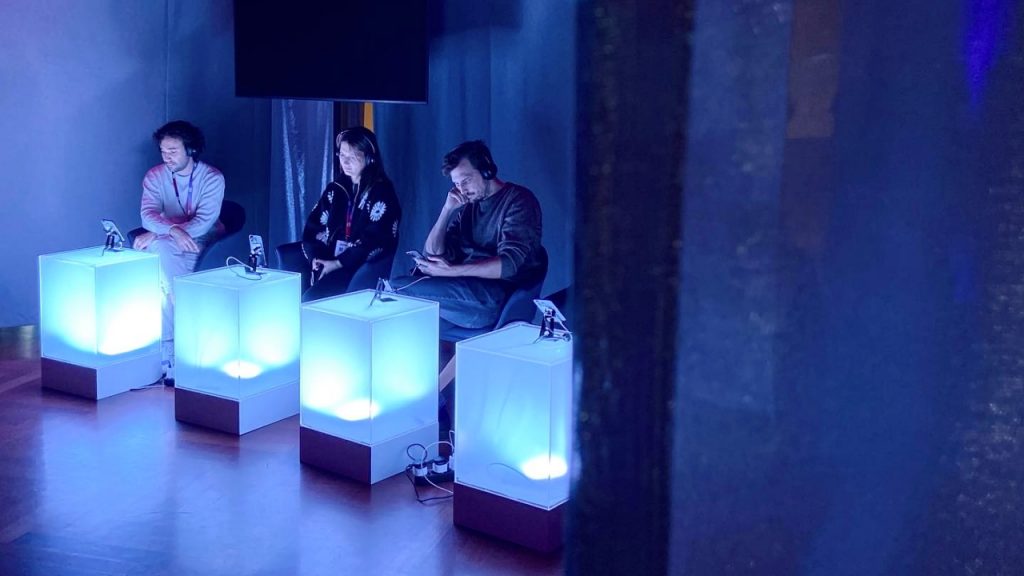
To see the future and understand our role in it
K. P. – What I always start with is to ask myself how I want the participant to feel when experiencing one of my works. And in this specific project, the most important thing for me was to activate a sense of agency in the participant.
My first projects, such as Riot AI and Perception iO, revolved around the idea of making people aware of their subconscious behaviour. However, at a time in history when we feel powerless and hopeless, it has also become essential to talk about agency, about autonomy, precisely in order to offer people not only a vision of the future but also a greater understanding of the role they themselves could play in this very future.
I wanted users to experience what a world is like where, in order to do anything, they have to get permission from the state. And with that I also wanted to show them the consequences of their acquiescence, and those of their opposition. It was like playing with a swing: on the one hand I built a world that the user could witness, but on the other hand I didn’t want them to be just passive observers. I wanted them to understand their part and be accomplices in this experience and how it developed. There are, in fact, multiple endings and multiple questions…. What could happen to you and what consequences could your behaviour (or acquainse) unleash? How does your attitude affect you? And if the person you are communicating with, in the story, is a friend of yours, how does your attitude affect them? Is the prejudice that hits this friend something you can influence in some way?
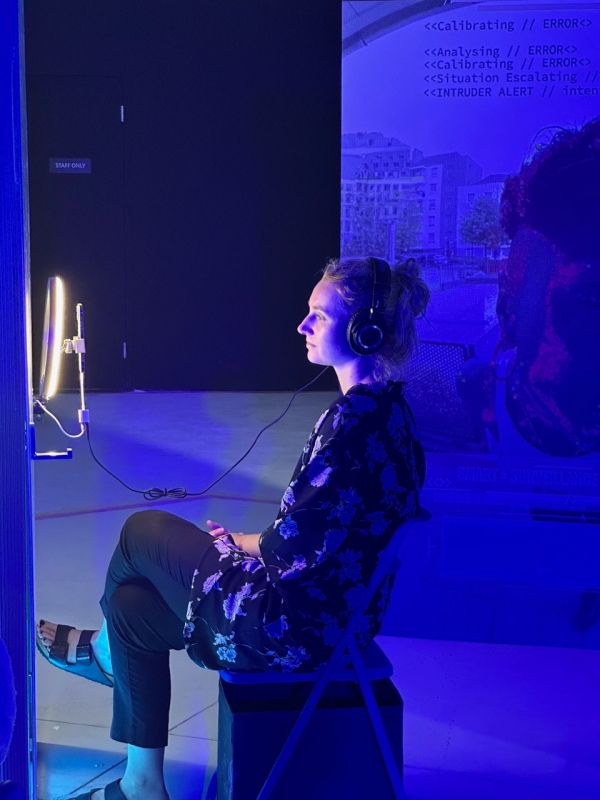
K. P. – From this point of view, CONSENSUS GENTIUM is like a multi-layered jigsaw puzzle that is put together over the course of the story and that has to challenge you as a person.
All the elements go in this direction: there are the characters with their motivations and narrative arc, there is the mise en scene, there is world building and vertical storytelling. There is filmmaking, and there are all these psychological themes that intersect, which I was able to develop by collaborating with neuroscientists and behavioural psychologists. Then of course there’s the whole technological aspect, which my team of technologists in the United States followed. A whole set of elements that make up this story and that must guarantee me a sense of authenticity for the user.
To give you an example, the search for authenticity is behind the choice of having your face appear in the bottom right-hand corner when you are talking on the phone with the other person, just as it would in a real conversation. It’s a detail, but one that I felt, like others, was essential to achieve the immersivity I wanted to recreate.
Meeting the public and opening the door to discussion
K. P. – I interacted with my audience in different ways. At the South By Southwest world premiere I never left the stand. People would leave the piece saying they were “traumatised” and I didn’t expect them to use words like that! They seemed genuinely affected by the work. Others were a bit more detached and said, ‘This is really smart. It’s really nice. I really liked it, it was really funny’. Some wanted to talk about how it had affected them, how it had influenced their perspective. Sometimes they would come back the next day and try to look at things differently.
This was exactly what I was looking for: it’s as if this work, wherever you are, whoever you are, gives you a way to draw from it what you need. If you are a slightly more reflective person, you can focus on AI and maybe get involved in a discussion about it. If you are knowledgable on the issues of AI, you can perhaps find extra material to reflect on the issues of regulation, transparency, democracy. If you simply want to experience a journey, you may find it an exciting experience to try.
Another event I presented CONSENSUS GENTIUM at was the Roundhouse Theatre, where I had a different set-up. I created a living room with a bed, a dining table, a sofa, and a coffee table. People would come into the space and try out the work and then I would let them decompress for half an hour. I accompanied the piece with an introduction, a mini TED talk. And with this format I also presented CONSENSUS GENTIUM at FilmFest München, to open the discussion on the subject. Recently, among other events, we were at the GIFF in Geneva, where the work went very well and was well received and discussed by the public.
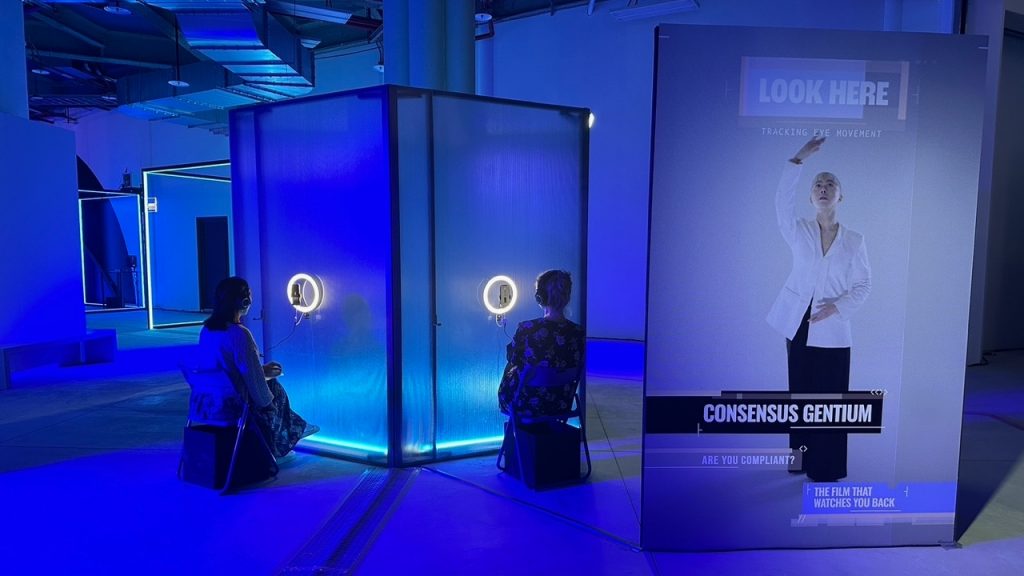
My big concern was that many people in the general public, particularly before AI became mainstream news, might find it difficult to access some of these conversations on artificial intelligence and related topics. And I guess CONSENSUS GENTIUM is also that: an entry point from which people can start exploring or thinking about these matters.
One thing we have not had the chance to do, though, is an impact evaluation of CONSENSUS GENTIUM – after all we are good guys, so we don’t collect that kind of data. However, we always observe and talk to our users to see if it was meaningful to them.
For example, I noticed several couples trying the work together. I find it interesting that even though it is on a mobile device, people want to share the experience… It gives me positive vibes for the second part, with which I want to deepen the mobile aspect, but I am interested in doing it through the creation of a collective experience!
What everyone believes today “and therefore must be true”
K. P. – Something everyone believes today is that the government has your best interests at heart. People think they can trust their State, that the State is there to protect them… but I have never had that sense of trust for the government.
My work is about individualism and activating one’s personal agency. This is because, as I always say, the future is not something that happens to us: it is something we build together. Many people are comfortable to just cruise through life, watch Netflix “and chill”. They think ‘that’s it‘.
I believe, however, that we create our reality to a large extent, or at least we possess the power to shape it dramatically. Unfortunately it is a concept that we are not taught and that most people do not know about, convinced that someone else will take care of things for us. Instead, I say, ‘No. You have to take care of your world. You have to be a true participant in this fantastic film called life’.
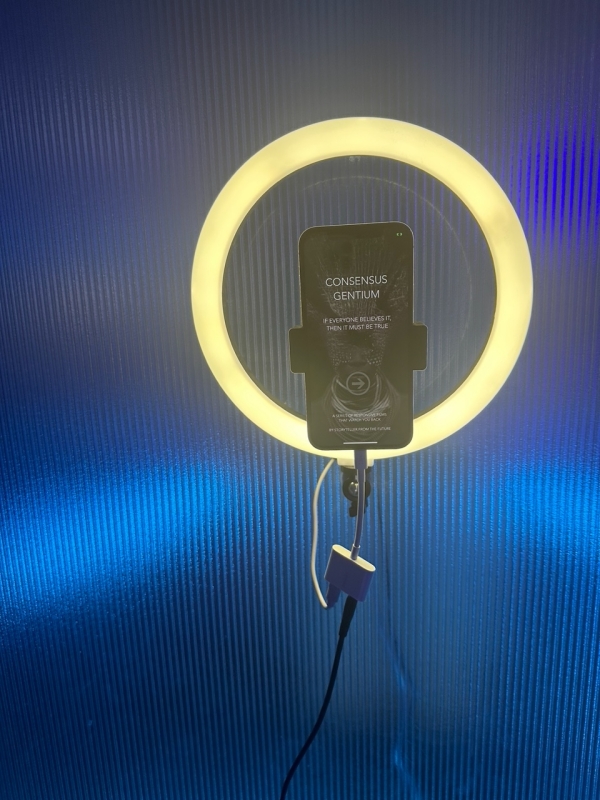
What I do with CONSENSUS GENTIUM is to try and reboot you psychologically, mentally, but also spiritually. As an artist, I feel that this is one of my greatest responsibilities. Abstract art, to paint on a canvas, today is not relevant to most people’s, there is no more time for this, artists need to be part of their creation, to create the world we live in! And that’s the concept I developed Hack The Future Lab around, the idea of world building for world building. So I’m looking at creating this world, because it’s going to impact the world in which we live
I’ve been doing this type of immersive experiences for more than ten years, I’ve been working with AI in the tech industry since 2016, and I felt compelled to create these kinds of experiences that connect with people’s souls. It’s my purpose as an artist.
Monsters exist, but they are too few in number to be truly dangerous. More dangerous are the common men, the functionaries ready to believe and to act without asking questions
– Quote by Primo Levi used in the intro of CONSENSUS GENTIUM
K. P. – CONSENSUS GENTIUM is dense with things happening and concepts. It is when you experience it but it was also when I was creating it. I had this mirror board of my whole project where I would put references to psychology, philosophy, images, reflections on agency… This phrase referring to the world war and the Holocaust, and therefore to global and universal suffering of people, was really representative of the role of the individual. It was the thread that highlighted the importance of agency.
The state cannot control those who do not want to be controlled, and the worst people are not the ones who work for the state or those who do what they are told, but the silent majority in the middle who simply do nothing. You have to choose sides, you cannot simply not decide, abdicate your power to someone else.
Parkour as a symbolic element of the challenges to be faced
K. P. – It is totally human at times to just forget and be passive. But that is also why I included the parkour element in CONSENSUS GENTIUM. I was parkour myself when I started working on the piece. Parkour is about moving through fear and knowing yourself. It requires concentration, which is what the piece also calls for. If you know that you have a goal to achieve, if you want to accomplish something in life, and you focus on that, all the things that try to stop you and that are in the periphery of your gaze will start to disappear because you are committed and focused on getting to that place, that goal.
Maybe there are people who have a much shorter path than you do to get to where you want to go, but they are so distracted that they get lost and can only look around without seeing. So the parkour I wanted to include is the element that represents concentration and commitment and shows how they are closely related to courage and overcoming fear.
Parkour also paved the way for me towards interactivity. In 2010 I was a practitioner of the sport and I started working with interactivity precisely to try to replicate this feeling of moving through fear. In 2012 I made a mobile app called Syncself, and Syncself 2 came in 2015: I wanted to allow people to have an experience where the media responded to them to replicate the options and choices you have with parkour. And from there, as I said, I started to delve deeper into the topic of social justice with Riot AI and Perception iO, which allowed me to get closer to this topic and that of artificial intelligence and the biases related to it. CONSENSUS GENTIUM took off when I started to evaluate the role of government and our role in the future.
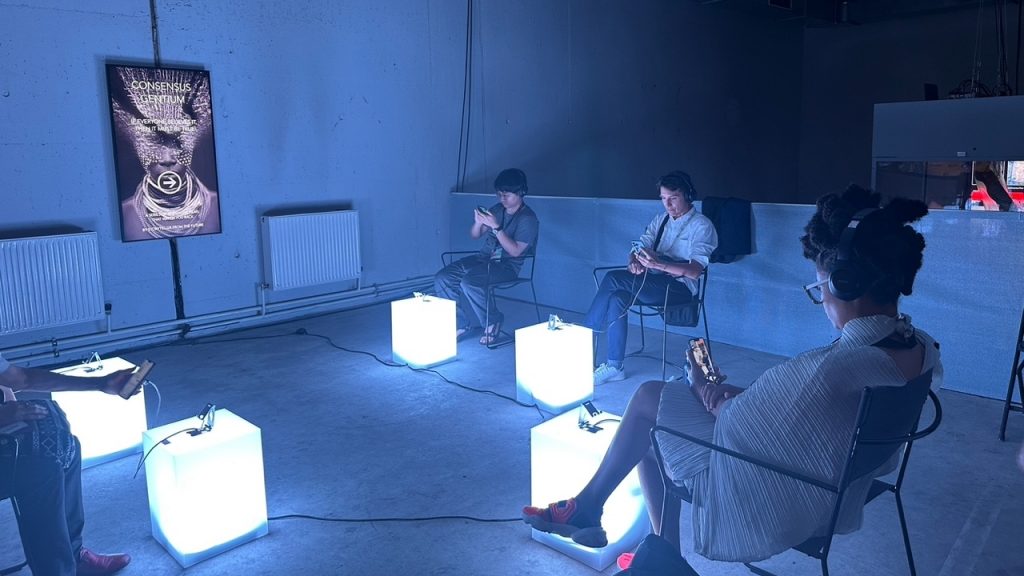
What’s to come: a brief insight on Source Code
K. P. – CONSENSUS GENTIUM is ‘the problem’: we have to think about democratising the governance of AI, the regulation of transparency. From this point of view, this first episode shows the future of the issue and its consequences. CONSENSUS GENTIUM 2, whose working title is Source Code, wants to show the future of the solution, the one implemented by us people, and part of this solution is the decolonisation of AI.
So, this second park at its core has three components for the solution: the first, that I’ve mentioned, is the decolonisation of AI. To do this, we must look specifically through the lens of minorities, diversity and people of colour, to connect with our ancestral cultural past as natives before colonisation and imagine what that world would have been like had their story remained unbroken. The second element regards the future: I want to explore the role of Futurism and whether it can actually impact the future or is just a speculative element. And if it is significant, what kind of futurism could have the most significant role?
This second layer is going to be developed in Europe, I hope perhaps in the Netherlands, because they have this strong philosophical and cultural understanding of this world, with institutes that are interested in actually studying futurism.
The third string of the bow is the present. So it’s about going back to AI and creating an AI toolkit that allows for resilience in the future. So it’s a very practical project.
An international project discussing universal themes
K. P. – The team I have been and am collaborating with is international, with team members from Australia, United States and England. I have also done research and development in the Netherlands.
Just as this internationalisation was important at the level of creation, I also wanted a global citizen to be present in the story, this somewhat disquieting functionary figure who has a somewhat Asiatic and non-binary aspect and who is difficult to frame. A child of this controlling world, whose cultural origin we can’t understand. The themes we explored, though, are in some respects more American, because in the three years I worked on the piece, AI was not yet a hot topic in Europe, but it was making a strong argument in US culture.
The second part will also be international, but in a different way from CONSENSUS GENTIUM.
This is the purpose of my work: the activation of critical and cognitive thinking. I want to break the chain in your head so that you can think for yourself
– Karen Palmer
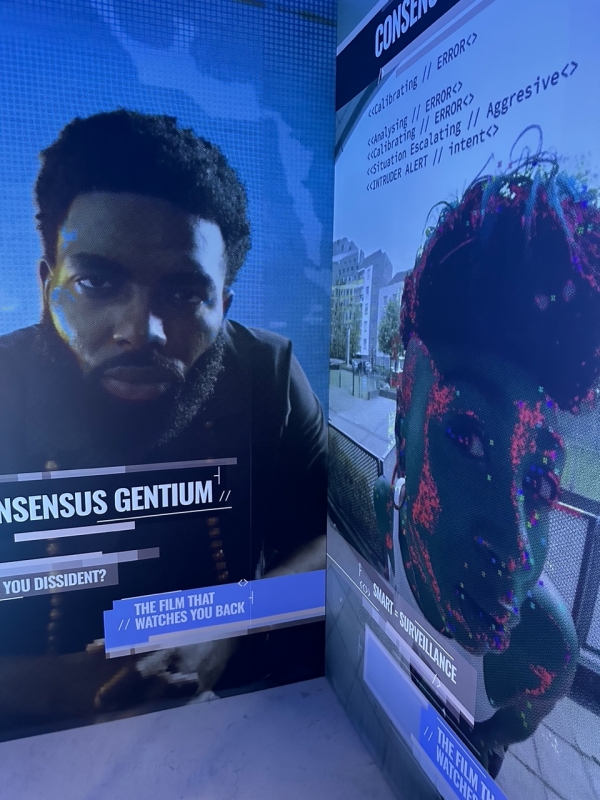
On democratising AI
K. P. – One of the first persons I took as a reference in my studies on AI was Joy Buolamwini, who recently published the book ‘Unmasking AI: My Mission to Protect What Is Human in a World of Machines‘. The author, who is a researcher at MIT, has been sounding the alarm on this issue for years, and back in 2016 I, who was the newcomer, was told by many to turn to her to better understand the subject.
Today she is part of the group making sure that Biden and the American government take a closer look at the ethics of AI. Recently, the UK also held a summit on AI. However, the UK is not about bias, it is about regulation and governance and honestly I would never put my future in the hands of those people. The State is often allied with big business, the ones that find loopholes to avoid paying taxes, to be clear, so I don’t expect the government to suddenly turn away from the personal gain they get from these companies and start really looking at the interests of the people.
There are a lot of discussions going on about regulation, however. In my opinion it’s going to be a long, uphill path, much more complex than we perceive, and I don’t think that the people who are going to make decisions about it are going to make them looking out for you and me. I don’t think that out of the blue they will start doing things for us, it just doesn’t work like that. I don’t hold out much hope in them.
But I think we can do something about it. We can listen to our own voice. Don’t be influenced by the group. If something doesn’t feel right, don’t do it! Be active, be alert. I just want people to recognise their true selves and start moving in that direction and everything else will follow! If you are interested in this topic, do some research. And spend some time thinking. You don’t always have to be on Instagram or Netflix, you can go away, turn everything off for half an hour and really try to figure out what interests you or what you believe in. It’s important to ask yourself a little bit more often, ‘What do I think about this? What is my belief? What is my dream? …What is my passion?”
I want people to wake up and, in this context, understand their role in the present and the future. In doing so they will see that everyone has a reason and a purpose. And it is within this realisation that the technology and culture we are moving towards can best develop.
So that is the purpose of my work: the activation of critical and cognitive thinking. I want to break the chain in your head so that you can think for yourself.
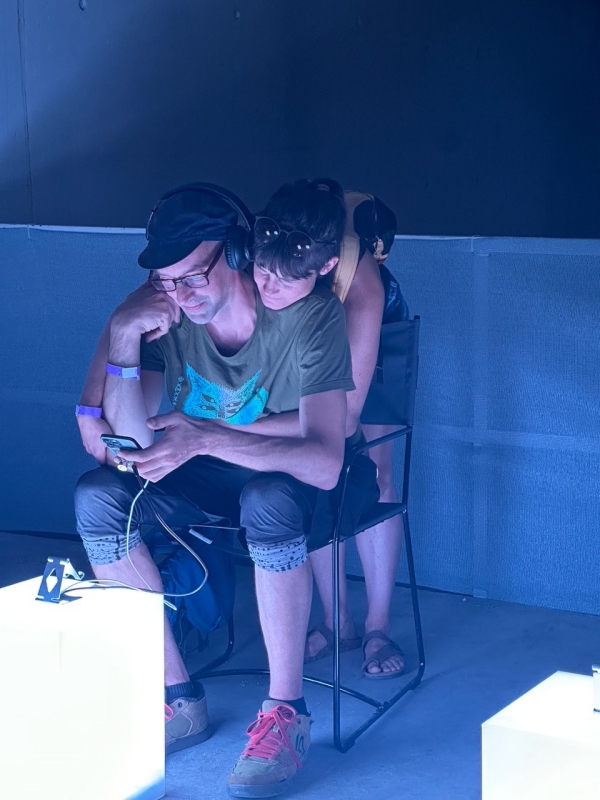
On the future of storytelling
K. P. – I am starting to use the expression ‘futures’, because there are different futures, depending on the perspective one comes from. As far as I am concerned, my perspective, as someone who works towards awareness and activation of agency, is to create stories in which I can concretely immerse people in a world. I call my experiences reality simulators, because they replicate the real world, as in the case of Riot AI.
These kinds of immersive simulations of the real world will become the new narratives. I think people will work a lot more in this direction, trying to give as much stimulation as possible to people experiencing a story: a small passive phone to watch something on will no longer be so meaningful, it will no longer stimulate our interest. The offer will have to be multisensory but also comfortable. In my opinion this is the future of storytelling.
But there is also another aspect of storytelling that interests me greatly, and that is the one that sees it almost as a rite of passage. There was a time when storytelling played the role of transformation, it represented a kind of cultural growth that took you from boy to man, from girl to woman. I feel that this has been lost with time but I have hope that we can bring it back and replace it with the passive, mindless experience that characterises some ways of enjoying stories today.
CONSENSUS GENTIUM’s festival run is not over yet! Follow updates on the official website and keep in touch with Karen Palmer and her futures-changing works here.
NB: CONSENSUS GENTIUM and Karen Palmer received several nominations for the XRMust Awards 2023| You can find out about all the other nominees at this link. Remember to vote for your favorites… survey closes on December 31!

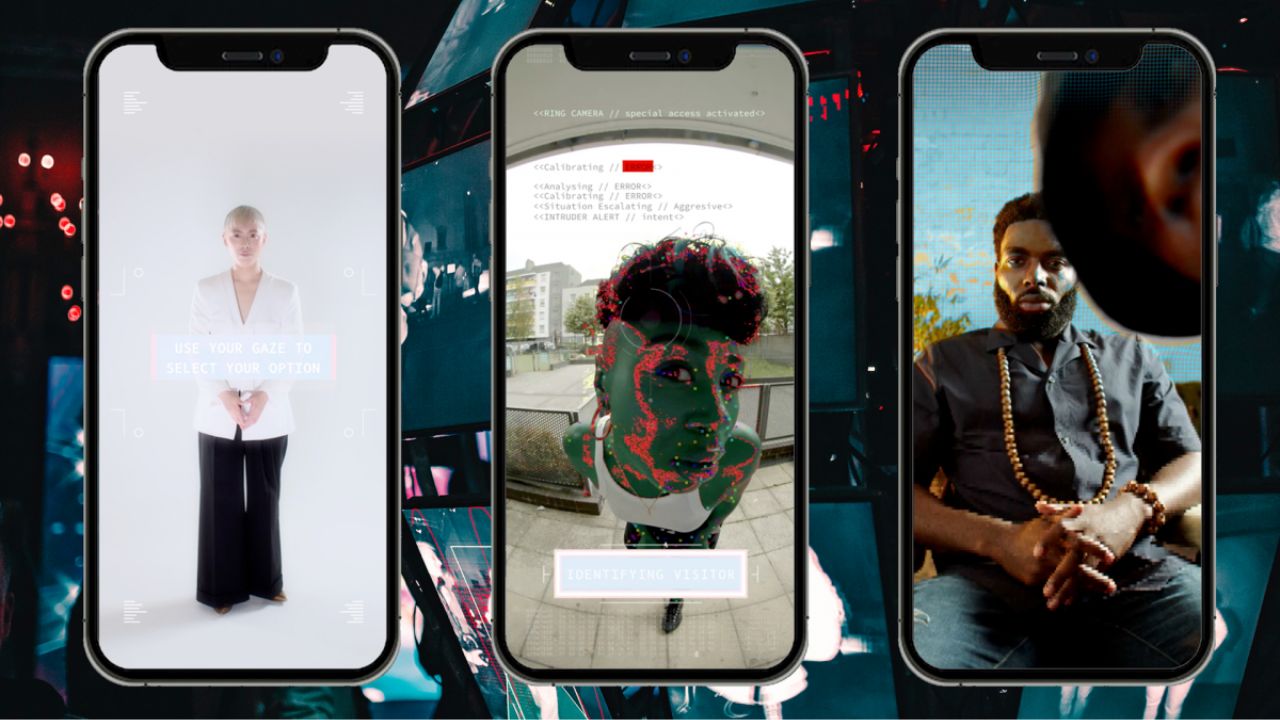

Leave a Reply
You must be logged in to post a comment.